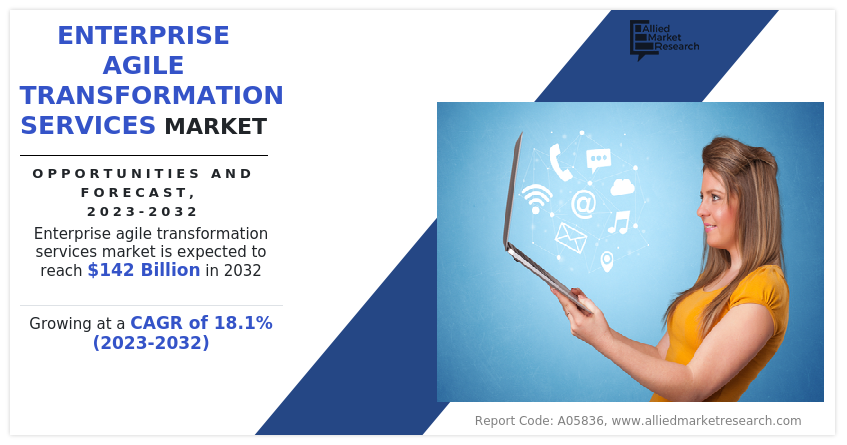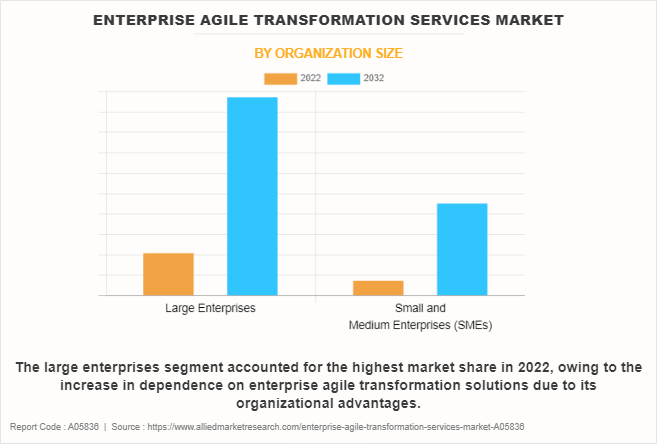Enterprise Agile Transformation Services Market Overview
The global enterprise agile transformation services market size was valued at USD 27.6 billion in 2022, and is projected to reach USD 142 billion by 2032, growing at a CAGR of 18.1% from 2023 to 2032.
The rise in adoption of agile approaches among major non-IT industries, such as manufacturing, retail, and healthcare, along with the robust growth of big data-based complex landscape are anticipated to provide numerous opportunities for the expansion of the market during the forecast period.
Key Market Insights
- By organization size, the small and medium-sized enterprises segment is expected to witness considerable growth in the upcoming years.
- By industry vertical, the retail segment is expected to witness the highest growth in the upcoming years.
- Region wise, Asia-Pacific is expected to witness significant growth during the forecast period.
Market Size & Forecast
- 2032 Projected Market Size: USD 142 Billion
- 2022 Market Size: USD 27.6 Billion
- Compound Annual Growth Rate (CAGR) (2023-2032): 18.1%

What is Enterprise Agile Transformation Services
Enterprise agile transformation services are a set of services that aid organizations to adopt agile principles and practices across the enterprise. These services typically include agile coaching, agile training, agile consulting, and agile tools and platforms. These services are generally offered by an agile transformation firm that partners with a team of professionals and collaborate with the business organization to develop a tailored agile transformation program. Furthermore, agile organizations are able to generate higher-quality products and services owing to the fact that they are able to iterate on products more quickly and get feedback from customers sooner. In addition, agile organizations create a more collaborative and engaged work environment, leading to improved employee morale and productivity. Thus, such benefits are providing significant growth opportunities in the enterprise agile transformation services market.
Upsurge in need for faster time-to-market in product development and the increase in need for better communication & collaboration among businesses are few of the enterprise agile transformation services market trends. In addition, the rise in shift from traditional transformation toward agile transformation is expected to fuel the growth of enterprise agile transformation service market. However, frequent failure rates is projected to limit the growth of this market.
The report focuses on growth prospects, restraints, and analysis of the global market trends. The study provides Porter’s five forces analysis to understand the impact of various factors, such as bargaining power of suppliers, competitive intensity of competitors, the threat of new entrants, threat of substitutes, and bargaining power of buyers on the global enterprise agile transformation services market share. The enterprise agile transformation services market is segmented into Service Type, Methodology, Consumer Type, Organization Size and Industry Vertical.
Segment Overview
The enterprise agile transformation services market is segmented on the basis of organization size, industry vertical, service type, methodology, consumer type, and region. By organization size, the market is divided into large enterprises and small and medium-sized enterprises. Based on industry vertical BFSI, IT and telecom, retail, media and entertainment, government and public sector, manufacturing, healthcare, hospitality, and others. By service type, it is segmented into agile consulting, agile development, agile training and coaching, and agile tools and system. By methodology, it is bifurcated into scrum, scrum XP, scrumban, kanban, custom hybrid, and others. On the basis of consumer type, it is segmented into individual consumers, trainer and coaches, and corporations/enterprises. Region-wise, it is analyzed across North America, Europe, Asia-Pacific, and LAMEA.

Depending on organization size, the large enterprises segment dominated the market in 2022 and is expected to continue this trend during the forecast period, owing to the increase in dependence on enterprise agile transformation solutions due to its organizational advantages such as it continuously improves on and delivers value for customers. However, the small and medium-sized enterprises segment is expected to witness considerable growth in the upcoming years, owing to increase in investments by the market players to develop enterprise agile transformation services among SMEs.

Region-wise, the enterprise agile transformation services market was dominated by North America in 2022 and is expected to retain its position during the forecast period, owing to the emergence of Industrial 4.0 revolution and rapid technological advancements, along with the favorable government support and initiatives in the region. However, Asia-Pacific is expected to witness significant growth during the forecast period, owing to the growing digital markets in Central and Southern Asia, along with the rise in IT and software development spending across the Asia-Pacific region.
What are the Top Impacting Factors in Enterprise Agile Transformation Services Market
Increase in Need for Accelerated Product Development
Increasing need for agile product development owing to the fact that it helps to enable continuous feedback and rapid improvement in transformation is driving the market growth. The need for accelerated product development through agile transformation service has been on the surging trend, and therefore, agile methodologies have gained wider popularity on account of their ability to respond to changing market demands and customer needs more effectively. Furthermore, agile development, with its iterative and incremental nature, allows faster provision of valuable features. This enables enterprises to seize opportunities and remain ahead of competitors. Thus, these aforementioned factors are projected to drive the growth of enterprise agile transformation services market.
In addition, agile transformation is considered as a decisive factor, which allows time to market, and facilitates to react faster to changes, thus sustaining the requirements of the user. Various studies have shown the benefits of agile adoption in the recent years, as the teams utilizing agile have been 50% faster to market, as well as 25% more productive. This serves as a key driver of market expansion. Moreover, prolonged development timelines have been considered as one of the major obstacles when it comes to generating returns on innovation as well as product development. The reduced speed-to-market in terms of product development & management offers several financial and non-financial benefits, such as faster innovation, lower development costs, larger market share, and high forecasting accuracy. Hence, agile transformation services are considered as a crucial factor, enabling time to market, and helps to react faster to changes in the technology, thus satisfying users’ requirement. Therefore, these aforementioned factors contribute in driving the growth of the global market.
Increase in Adoption of Agile Services Among Non-IT Industries
Over the last decade, agile development and transformation services have been witnessed a considerable adoption in non-IT organizations. While agile methodologies initially gained a wide popularity in the software development and IT sectors, and their effectiveness in encouraging collaboration, adaptability, and customer-centricity has led to their extensive adoption in various non-IT domains.
This is primarily attributed to the core principles of agile transformation that help organizations to deal with complex systems and processes within an organization. Several useful features such as workflow tracking and story mapping & analytics are some major factors to attract non-IT industries, such as BFSI, manufacturing, finance, healthcare, and others. For instance, agile can help healthcare organizations to improve the quality of care and to reduce costs, while, in finance, agile can help financial institutions to improve risk management and compliance processes. Therefore, these aforementioned trends are expected to promote the enterprise agile transformation services market growth all over the world.
Moreover, the rise in need for improved visibility & predictability among teams and focus on continuous improvement in product development & management have been shifting the preference of companies from traditional methodologies to agile methodologies. This results in various successful implementations of agile transformation. For instance, as per the study conducted by the Consultancy Organization in September 2021, India’s businesses are among the frontrunners when it comes to agile implementation, putting them in a strong position to take advantage of a future economic recovery. Hence, the significant implementation of agile methodologies in non-IT sector is expected to fuel the growth of enterprise agile transformation services industry during the forecast period.
Which are the Key Companies in Enterprise Agile Transformation Services.
The following are the leading companies in the enterprise agile transformation services market. These players have adopted various strategies to increase their market penetration and strengthen their position in the industry.
Scrum Inc.
SCRUMstudy
Scrum Alliance
Scrum Org
Project Management Institute (PMI)
SAFe
IC Agile
Agile Business Consortium
Lean Agile Institute
Accenture Plc.
Capgemini SE
Isos Technology
Atlassian
Broadcom Inc.
Apptio.
Digital Capabilities
Enterprise agile transformation services primarily aim to facilitate organizations adopt agile methodologies and principles at a significant scale, allowing them to become more responsive, adaptable, and customer-centric. In recent digital age, digital capabilities play a substantial role in aiding and improving the success of these transformations. Few key digital capabilities that are commonly leveraged in enterprise agile transformation are agile project management tools like Jira, Trello, and Asana, DevOps tools, integration of collaboration and communication platforms, blockchain and distributed ledger technology, artificial intelligence (AI), machine learning (ML), API management platforms, and more. Hence, the surge in technological advancements in enterprise agile transformation services is expected to create numerous opportunities for global market growth.
In addition, digital service providers are constantly adopting partnerships and product launches as a critical business strategy to expand the proliferation of enterprise agile transformation services. For instance, in June 2022, India-based Hinduja Tech, a leading e-mobility engineering and digital services company, partnered with Senseye, a globally trusted sustainable machine health management company. This partnership aims to deliver industry 4.0 digital transformation services, enterprise mobility services, full stack IT development, testing, and support services using its agile development methodology and accelerators. Such strategic development and digital transformation initiatives are expected to reinforce the growth and development of enterprise agile transformation services market.
Government Initiatives
The government initiatives related to enterprise agile transformation services are gaining a significant momentum in several countries. These initiatives directed to help government agencies adopt agile principles and practices to enhance the competence, responsiveness, and delivery of services. Further, countries in the developing economies, such as India and China, have perceived a substantial growth in agile adoption as more organizations acknowledge the potential benefits of agility in delivering products and services. On contrary, agile initiatives across government function also varies in different geographies, aiming to develop more adaptive, anticipatory, inclusive, and sustainable business environment to navigate the pace of change. For instance, the U.S. federal government introduced the Federal Agile Acquisition Framework (FAAF) to promote agile procurement and project management practices. It encourages federal agencies to adopt agile methodologies when acquiring and managing IT systems and services. The aim is to reduce waste, improve outcomes, and enhance collaboration with industry partners. Thus, the rise in government support is paving the demand for global enterprise agile transformation market.
Many governments have begun to use agile methodologies to tackle a range of challenges, such as inflexible and slow processes, lack of customer focus, long time-to-market, and limited transparency and communication, among others. As a result, the rise in government initiatives to implement agile practices constantly contributes in the expansion of enterprise agile transformation services market.
What are the Key Benefits for Stakeholders
This report provides a quantitative analysis of the market segments, current trends, estimations, and dynamics of the enterprise agile transformation services market analysis from 2022 to 2032 to identify the prevailing enterprise agile transformation services industry opportunities.
The market research is offered along with information related to key drivers, restraints, and opportunities.
Porter's five forces analysis highlights the potency of buyers and suppliers to enable stakeholders make profit-oriented business decisions and strengthen their supplier-buyer network.
In-depth analysis of the enterprise agile transformation services market forecast assists in determining the prevailing market opportunities.
Major countries in each region are mapped according to their revenue contribution to the global market.
Market player positioning facilitates benchmarking and provides a clear understanding of the present position of the market players.
The report includes an analysis of the regional as well as global enterprise agile transformation services market share, key players, market segments, application areas, and market growth strategies.
Enterprise Agile Transformation Services Market Report Highlights
| Aspects | Details |
| Market Size By 2032 | USD 142 billion |
| Growth Rate | CAGR of 18.1% |
| Forecast period | 2022 - 2032 |
| Report Pages | 585 |
| By Service Type |
|
| By Methodology |
|
| By Consumer Type |
|
| By Organization Size |
|
| By Industry Vertical |
|
| By Region |
|
| Key Market Players | Atlassian, Scrum Org, Apptio, Scrum Alliance, IC Agile, SCRUMstudy, Scaled Agile, Inc., Project Management Institute (pmi), Broadcom Incorporated, Agile Business Consortium Limited, Scrum Inc., Lean Agile Institute, Capgemini SE, Isos Technology, Accenture plc |
Analyst Review
The global enterprise agile transformation services market is witnessing decent growth, due to the significant shift in business needs with recent technological advances, coupled with the favorable government policies and mandates for agile transformation services.
According to CXOs of the leading companies, agile services assist organizations to aid and implement delivery functions to foster customer engagement and business collaboration. Agile transformation also helps to create more collaborative, open, creative, and efficient business environment as compared to conventional business models. Moreover, several benefits are associated with agile transformation such as reduced costs, high product quality, higher levels of customer satisfaction & success, shortened time-to-market, more flexibility in project management, and faster feedback & ROI, which drive the adoption of these services across various industries.
The global enterprise agile transformation services market has an incredibly competitive and fragmented environment consisting of a range international and regional players. Though the market is relatively in growing stage in terms of market share, it is expected to become the major software deployments in the upcoming years. Key players in the enterprise agile transformation services market such as Accenture, Agile Sparks, and Broadcom Inc., account for a significant share of the market. With larger requirements for enterprise agile transformation services, companies introduced various strategies to strengthen their market position capabilities. For instance, in May 2021, Accenture acquired Fable+, a consulting firm specializing in business agility and analytics-driven transformation. Fable’s team of 50 professionals joined Accenture’s Talent & Organization/Human Potential team, adding highly specialized expertise focused on organizational transformation.
In addition, with the surge in demand for enterprise agile solutions, various companies have expanded their current services to continue with the rising demand in the market. For instance, in February 2020, Tata Consultancy Services, a leading global IT services, consulting, and business solutions organization, unveiled Jile 4.0, a major release of its cloud enterprise Agile DevOps platform that allows software teams to automate, manage, and measure the end-to-end software delivery value stream from ideation to deployment. Such strategic initiatives are expected to propel the growth of the enterprise agile transformation services market.
Upsurge in need for faster time-to-market in product development and the increase in need for better communication & collaboration among businesses are driving the growth of the market. Conversely, the rise in adoption of agile approaches among major non-IT industries, such as manufacturing, retail, and healthcare, along with the robust growth of a big data-based complex landscape is anticipated to provide numerous opportunities for the expansion of the market during the forecast period.
Based on methodology, the scrum segment was the highest revenue contributor to the market in 2022.
Region-wise, the enterprise agile transformation services market was dominated by North America in 2022 and is expected to retain its position during the forecast period.
The global enterprise agile transformation services market size was valued at $27,621.57 million in 2022, and is projected to reach $141,985.14 million by 2032, growing at a CAGR of 18.1% from 2023 to 2032.
The global enterprise agile transformation services market is dominated by key players such as Scrum Inc., SCRUMstudy, Scrum Alliance, Scrum Org, Project Management Institute (PMI), SAFe, IC Agile, Agile Business Consortium, Lean Agile Institute, Accenture Plc., Capgemini SE, Isos Technology, Atlassian, Broadcom Inc., and Apptio.
Loading Table Of Content...
Loading Research Methodology...



